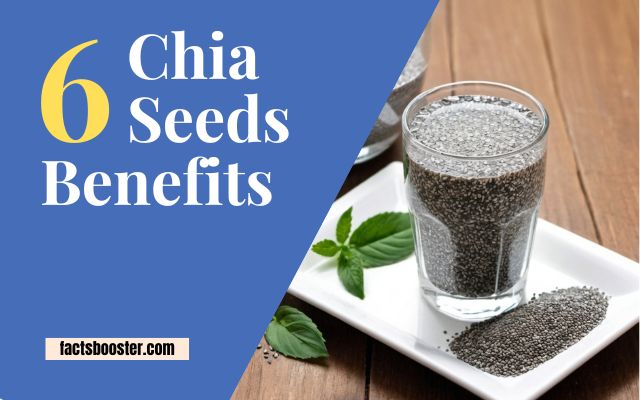There are plenty of chia seeds benefits, before you embark on a journey toward optimal health, an essential question looms: Is incorporating chia seeds into your diet necessary for you? It isn’t just about following a trend; it cuts deeper, touching on health and well-being facets.
Chia seeds are tiny powerhouses packed with nutrients that can make a significant difference in your overall health. Consulting healthcare providers will give you an in-depth understanding of your body’s needs and how chia seeds can play a role. They look beyond the superficial, assessing factors like digestive health, heart health, and potential benefits tied to these nutritious seeds.

Nutrition of Chia Seeds
Chia seeds are celebrated for their impressive nutritional profile. Here’s what makes them stand out:
- High in Fiber: Chia seeds are an excellent source of dietary fiber, promoting digestive health and helping to keep you feeling full longer.
- Rich in Omega-3 Fatty Acids: These essential fats are crucial for heart health and brain function.
- Excellent Source of Protein: Chia seeds provide a complete protein source, containing all nine essential amino acids.
- Packed with Vitamins and Minerals: Including calcium, phosphorus, magnesium, and antioxidants, chia seeds contribute to overall health and well-being.
Chia Seeds Benefits
Chia seeds, often hailed as a superfood, pack a powerful nutritional punch in their tiny form. Rich in essential nutrients and offering a wide range of health benefits, these seeds can easily elevate your daily diet.
From supporting digestive health to boosting heart health and aiding in weight loss efforts, chia seeds provide a versatile and effective way to enhance overall well-being. Here’s a closer look at the impressive benefits chia seeds offer.
1. Supports Digestive Health
The high fiber content in chia seeds is one of their most significant benefits. Each serving of chia seeds provides a substantial amount of both soluble and insoluble fiber. Soluble fiber absorbs water, forming a gel-like substance that slows down digestion, which helps regulate blood sugar levels and lowers cholesterol.
Insoluble fiber adds bulk to stool, promoting regular bowel movements and preventing constipation. This combination makes chia seeds a natural choice for improving digestive health and maintaining a healthy gut. (1)
2. Boosts Heart Health
Chia seeds are an excellent source of omega-3 fatty acids, particularly alpha-linolenic acid (ALA). Omega-3s are essential for heart health as they help lower blood pressure, reduce bad cholesterol (LDL) levels, and decrease triglycerides.
Consuming omega-3s also helps reduce inflammation in the body, which is a risk factor for heart disease. By incorporating chia seeds into your diet, you can support overall heart health and reduce the risk of cardiovascular conditions. (2)
3. Enhances Weight Loss Efforts
Chia seeds are low in calories but packed with essential nutrients, making them an ideal addition to any weight loss plan. They absorb up to 12 times their weight in water, expanding in your stomach and increasing feelings of fullness and satiety.
This helps to control hunger and reduce overall calorie intake. Additionally, the high fiber content aids in digestion and stabilizes blood sugar levels, preventing energy crashes that can lead to unhealthy snacking. For those looking for effective weight loss tips, chia seeds provide a nutritious, filling option.
Read more:
4. Strengthens Bones and Teeth
Chia seeds are rich in calcium, phosphorus, magnesium, and protein, all of which are vital for maintaining strong bones and teeth. Just one ounce of chia seeds contains 18% of the recommended daily intake of calcium, which is higher than most dairy products.
Calcium and phosphorus work together to build and maintain bone density, while magnesium is essential for bone formation and the proper functioning of enzymes involved in bone metabolism. Including chia seeds in your diet can support bone health and reduce the risk of osteoporosis and dental issues. (3)
5. Regulates Blood Sugar Levels
The high fiber content and gel-forming ability of chia seeds slow down the digestion and absorption of carbohydrates, leading to a gradual release of glucose into the bloodstream.
This helps to stabilize blood sugar levels and prevent spikes and crashes that can occur after eating high-glycemic foods. For individuals with diabetes or those looking to regulate their blood sugar, chia seeds can be a valuable addition to their diet, aiding in blood sugar management and overall metabolic health.
6. Provides Antioxidant Protection
Chia seeds are packed with antioxidants, which help protect the body from damage caused by free radicals. Free radicals are unstable molecules that can cause oxidative stress, leading to chronic inflammation and various diseases, including cancer.
The antioxidants in chia seeds, such as quercetin, chlorogenic acid, and caffeic acid, help neutralize these harmful molecules, reducing inflammation and promoting overall health and longevity. By incorporating chia seeds into your diet, you can benefit from their powerful antioxidant properties, contributing to long-term health and disease prevention.
How to Incorporate Chia Seeds into Your Diet
Incorporating chia seeds into your diet is simple and versatile. Here are some ideas:
- Adding to Smoothies: Boost your smoothie’s nutritional value by adding a tablespoon of chia seeds.
- Mixing into Yogurt or Oatmeal: Sprinkle chia seeds into your morning yogurt or oatmeal for an extra nutrient boost.
- Baking with Chia Seeds: Include chia seeds in your baking recipes for bread, muffins, and cookies.
- Making Chia Pudding: Combine chia seeds with your favorite milk and sweetener, then let it sit overnight for a delicious pudding.
- Sprinkling on Salads: Add a crunchy texture and nutrition to your salads by sprinkling chia seeds on top.
Tips for Using Chia Seeds
To get the most out of chia seeds, consider these tips:
- Proper Storage: Keep chia seeds in an airtight container in a cool, dry place to maintain their freshness.
- Soaking Chia Seeds: Soak chia seeds in water or milk to create a gel-like consistency, making them easier to digest and enhancing their nutritional benefits.
- Best Practices for Consumption: Start with small amounts and gradually increase your intake to avoid digestive discomfort.
Important Considerations
While chia seeds offer numerous health benefits, it’s essential to be mindful of a few important considerations to ensure you enjoy them safely and effectively.
Potential Allergies
Though rare, some individuals may be allergic to chia seeds. If you have never consumed chia seeds before, start with a small amount to check for any adverse reactions such as itching, swelling, or difficulty breathing. If you experience any of these symptoms, discontinue use immediately and consult a healthcare professional.
Proper Hydration
Chia seeds can absorb up to 12 times their weight in water. If consumed dry, they can potentially expand in your esophagus and cause a blockage, which could be dangerous. Always soak chia seeds in water or another liquid before consuming them to ensure they are adequately hydrated.
Digestive Issues
Due to their high fiber content, consuming large quantities of chia seeds may lead to digestive issues such as bloating, gas, or constipation, especially if your diet is not already high in fiber. It is recommended to gradually introduce chia seeds into your diet and increase your water intake to help your digestive system adjust.
Interaction with Medications
Chia seeds can affect blood sugar levels and blood pressure, which may interfere with medications prescribed for diabetes or hypertension. If you are taking medication for these conditions, consult your healthcare provider before adding chia seeds to your diet to ensure there are no potential interactions.
Moderation is Key
While chia seeds are nutritious, it’s important to consume them in moderation. The recommended daily intake is about 1-2 tablespoons. Overconsumption can lead to excessive fiber intake, which might cause digestive discomfort.
Storage and Shelf Life
To maintain the freshness and nutritional value of chia seeds, store them in an airtight container in a cool, dry place. Proper storage can help prevent the seeds from going rancid and ensure they retain their beneficial properties.
By keeping these considerations in mind, you can safely incorporate chia seeds into your diet and enjoy their numerous health benefits.
Conclusion
Incorporating chia seeds into your diet can provide numerous health benefits, from improved digestive health to enhanced heart health and weight management. These tiny seeds are packed with nutrients that support overall well-being.
By exploring various ways to add chia seeds to your meals and following the tips for using them effectively, you can enjoy the numerous chia seeds benefits and boost your health deliciously and effortlessly. Try chia seeds today and share your favorite recipes and experiences!


